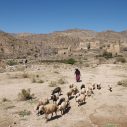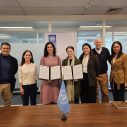
Search
The Multidimensional Poverty Peer Network (MPPN): A Space for Innovation in the Face of COVID-19

Good ideas rarely spring from the minds of those who have had little contact with others.
The symbolic apple that fell from the tree in front of Newton, sparking his idea of universal gravity, is really just a symbol of an exceptional mind. In order for his ideas to develop, Newton read, discussed, and exchanged ideas with others.
A good example of the importance of the exchange of valuable ideas and experiences is exemplified by what has occurred in the area of measurement of multidimensional poverty in recent years. In the twentieth century, academics theorized about multidimensional poverty – in the twenty-first century, improved data and methodologies, based on what had been built before, took that idea even further. Nonetheless, the final push to make the measurement of multidimensional poverty a reality came from the interest in and interchange of experiences that took place among developing countries.
A decade ago, Colombia, Mexico and Bhutan, among other countries, saw the need to generate better ways of measuring poverty. To that effect, they combined the experiences of local experts and public policy makers, the support of international researchers and institutions, and very importantly, the interchange of experiences among those same countries to generate multidimensional poverty indices (MPIs) at a national level.
This interchange among peers was formalized in 2013 with the launch of the Multidimensional Poverty Peer Network (MPPN), backed by the Oxford Poverty and Human Development Initiative (OPHI) at the University of Oxford, with further backing from Sabina Alkire, the government of Colombia, and support from Professor Amartya Sen. The Network has been able to systematically generate high-level exchanges among heads of state, ministers, and directors of statistics, as well as a great amount of experience with technical, operational, and implementation goals in the countries. At an international level, the Network has brought attention to the measurement and reduction of multidimensional poverty in the context of the Sustainable Development Goals (SDGs).
There are now 60 countries and 20 international institutions participating in the MPPN, and it is more active than ever, especially since the COVID-19 pandemic has burst on the world scene.
There are now 60 countries and 20 international institutions participating in the MPPN, and it is more active than ever, especially since the COVID-19 pandemic has burst on the world scene. Throughout 2020 there has been growing interest in the need for countries and institutions to have tools to measure and confront the pandemic.
In an event early this year, countries shared their experiences with goals and actions they had taken at the outset of the pandemic. Some countries used their MPI to better focus on their emergency support systems, other have projected the impact that the pandemic will have on multidimensional poverty in 2020.
Participants were also able to share their experiences with regional goals in the face of this terrible pandemic with Luis F. López-Calva, the Regional Director for the United Nations Development Programme (UNDP) in Latin America and the Caribbean.
A second event this year was very helpful in learning how to use the indices of multidimensional vulnerabilities which, in combination with the MPI, provide valuable information about groups at risk in the face of COVID-19. A clear example is Colombia’s use of those tools in urban regions of the country, which has helped in the design of public policies for income support for the poorest individuals. This presentation was made by Juan Daniel Oviedo, Director of the Colombian National Statistics Office (DANE).
COVID-19 continues to be an enormous threat for the entire world. We continue to face great uncertainty about how to battle against it to save lives and return to well-being. It is certain, however, that when many minds come together to think and exchange their perspectives and experiences, real solutions may arrive sooner. The Multidimensional Poverty Peer Network is an excellent place to do that.
This article was published in Dimensions 10.
















